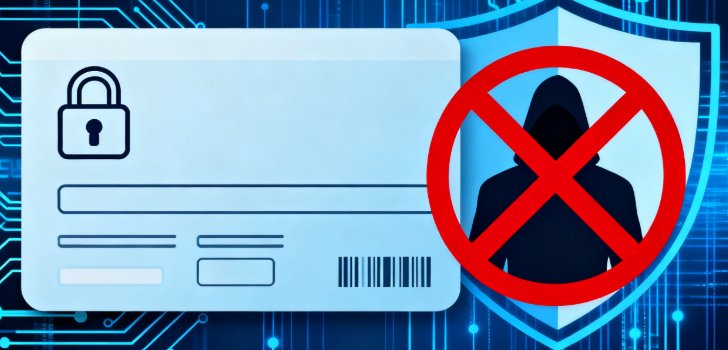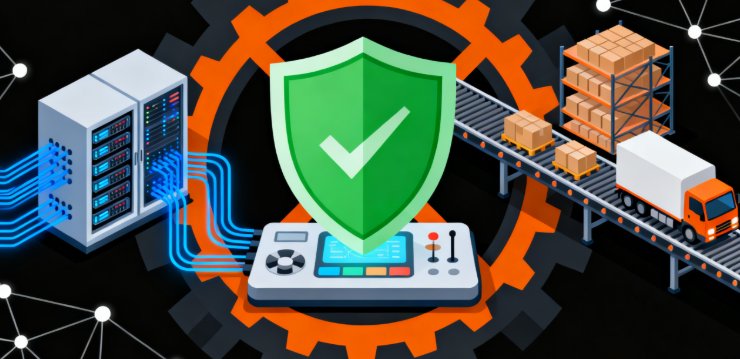How MDM Logistics Solutions Can Strengthen Logistics Cybersecurity
KNP, a 158-year-old UK transport company, collapsed in 2025 after hackers exploited nothing more than a weak password. Within days, 700 employees were out of work and shipments were stranded. The lesson for logistics is clear: in today’s logistics cybersecurity environment, data is as valuable as cargo. A single gap in cybersecurity for logistics companies can stop fleets faster than fuel shortages or traffic jams.
1Why Logistics Cybersecurity Matters
Modern logistics runs on information as much as it does on trucks and warehouses. Every shipment plan, customs filing, and customer order flows through mobile devices and cloud systems. That makes the industry a perfect target: attackers don’t need to steal a truck if they can lock down the data that moves it.

What’s at risk if that data gets exposed or held hostage?
Shipment data - The Risks of Hijacking Routes and Tracking
When hackers gain access to shipment data, they can manipulate routes, manifests, and tracking numbers. This makes it easy for them to reroute goods or hijack entire shipments. Imagine a scenario where your fleet’s route is altered midway — deliveries are delayed, and the cargo ends up in the wrong hands. It’s not just about losing goods, it's about losing trust with customers who rely on you to deliver on time, every time. This kind of data breach can cost a logistics company millions, not just in the stolen goods but also in reputational damage.

Customer information - Protecting Sensitive Data from Identity Theft
Logistics companies handle sensitive customer data every day: names, addresses, phone numbers, and even payment information. When this data is exposed, it becomes a valuable commodity on the dark web. Cybercriminals can use this information for identity theft, fraudulent transactions, or even extortion. Worse, if customer data is compromised, the company’s reputation takes a huge hit. Customers expect their information to be secure, and a breach can lead to a loss of business, legal consequences, and fines under data protection laws like GDPR.

Compliance records - The Impact of Data Breaches on International Shipments
Logistics companies also deal with vital compliance records, such as customs filings and safety certificates. These documents are essential for the smooth operation of cross-border shipments. If hackers encrypt or hold these records hostage, they can bring operations to a grinding halt. For example, a ransom demand for a customs filing could delay shipments for days, costing a company millions in fines and lost business. Additionally, if these compliance records are altered or tampered with, it can lead to violations of international trade laws, resulting in severe legal repercussions.

Operational continuity - Preventing Downtime
In logistics, operational continuity is everything. If systems freeze or fail, the ripple effect is huge — warehouses stop, trucks sit idle, and deliveries get delayed. Every minute of downtime translates to lost revenue, operational inefficiencies, and customer frustration. For instance, if a fleet management system goes offline, drivers might not know their next route, deliveries might be missed, and the whole network can come to a halt.

Hackers know logistics can’t afford downtime. That urgency makes companies prime ransomware targets. And the damage goes well beyond ransom fees: lost revenue, fines, and broken customer trust follow. Statistics on cybersecurity breaches in logistics confirm this trend, showing just how serious cybersecurity risks for logistics companies have become.
2How MDM Strengthens Cybersecurity in Logistics
Every mobile scanner, tablet, and in-truck device is a potential doorway for attackers. MDM solutions give companies a way to secure them without slowing down daily work. This approach reflects logistics cybersecurity best practices and helps fight common cybersecurity threats to logistics companies.
If you want to dive deeper into how AirDroid Business can help secure your logistics devices, check out our product datasheet for detailed features and specifications.
Here’s how MDM helps:
Device Monitoring: Stopping Problems Early
With MDM, security teams see every registered device in real time. They can block unapproved apps, enforce settings, and get alerts when something suspicious happens — like a login from the wrong country.
Data Encryption: Protecting What’s Inside
If a device is lost or stolen, MDM makes sure sensitive data stays locked. Encryption and role-based access mean information is safe, and admins can remotely lock or wipe devices before any damage is done.
Patch Management: Closing the Door on Hackers
Outdated software is one of the easiest ways in. MDM lets IT roll out patches and updates across all devices at once — whether it’s a warehouse scanner or a driver’s tablet. No device gets left behind.
Incident Response: Acting Fast When It Counts
When something slips through, speed is everything. MDM can isolate compromised devices, send real-time alerts, and restore systems quickly so shipments keep moving.
Threat vs. MDM Response
| Threat | MDM Response |
|---|---|
| Lost or stolen device | Remote lock & wipe protects sensitive data |
| Unauthorized access | Role-based controls and login monitoring |
| Outdated apps or OS | Automated patching across the fleet |
| Malware infection | Device isolation and instant alerts |
Case in point: Picture a busy distribution center with hundreds of scanners. If one scanner gets hacked, attackers could use it to sneak into the entire network. With MDM, that device can be quarantined and wiped in minutes, while a replacement is set up automatically. Staff keep working, shipments keep moving, and the breach is contained. That’s how cybersecurity solutions for logistics companies make a difference on the ground.
If you want to seek a reliable MDM solution to protect all your logistics devices and avoid any kind of data leaks, we'll recommend Airdroid Business - a comprehensive MDM solution designed to streamline logistics operations while protecting critical data and ensuring continuity. With features like real-time device tracking, remote troubleshooting, and robust security policies, AirDroid Business ensures that your logistics team is always one step ahead in managing risks and maintaining a secure environment.
3The Cybersecurity in Logistics Market & Compliance Challenges
The cybersecurity in logistics market is expanding fast. As supply chains go digital, criminals see more opportunities, and regulators push for tighter controls.
- Compliance pressures: Meeting GDPR, ISO, or CTPAT isn’t optional. Strong logistics cybersecurity compliance avoids fines and smooths audits.
- Company culture: Tools are only half the battle. Building a strong cybersecurity culture in logistics companies helps staff avoid phishing traps and unsafe shortcuts.
- Digital platforms: Even cybersecurity for logistics websites matters. Booking portals and tracking tools are popular targets for attackers.
- Industry updates: Following logistics cybersecurity news keeps companies alert to new threats and attack patterns.
The point is simple: cybersecurity challenges in logistics companies go far beyond devices. But MDM gives teams a solid foundation to build broader defenses on top.
4Final Thoughts
It’s no longer a question of if logistics companies will face attacks, but when. From ransomware to phishing, the threats are constant. That’s why investing in cybersecurity for logistics pays off. The ROI of logistics cybersecurity is clear: preventing a single breach can save millions in ransom, fines, and reputational losses.
For companies that want security without adding complexity, MDM is a practical first step. It locks down devices, simplifies patching, and buys you time to build a stronger defense.







Leave a Reply.